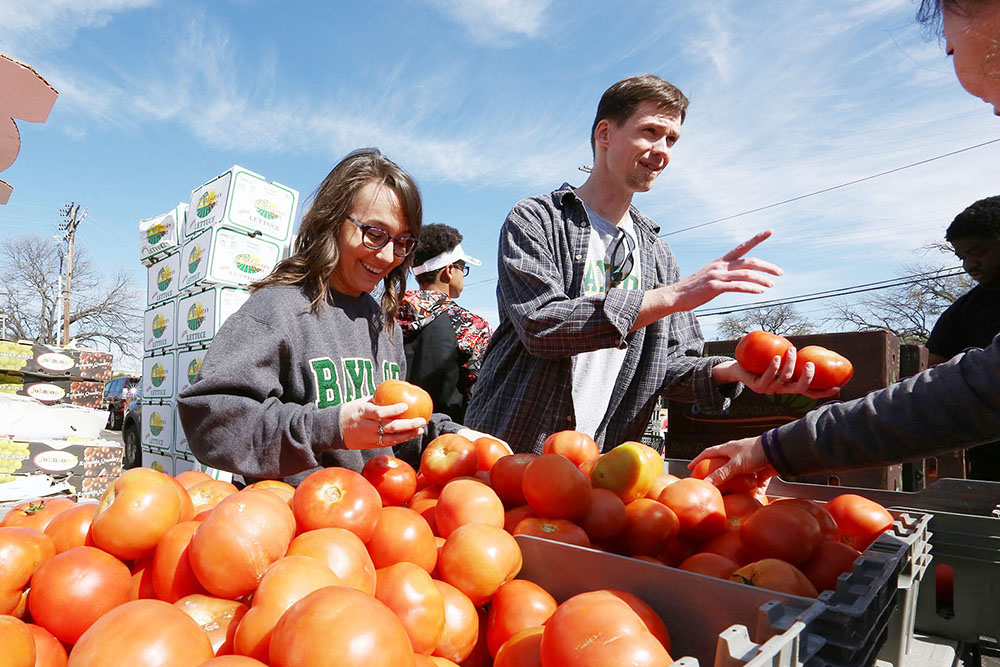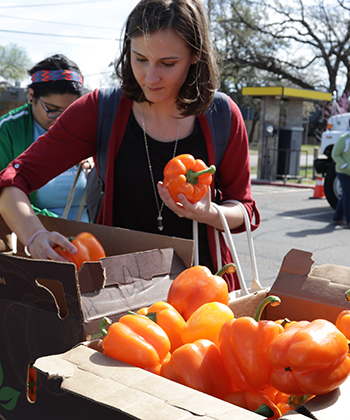Cover Story: Hunger at Baylor?
It might be hard to believe that food insecurity is a problem at a private university like Baylor, but research by Dr. Nathan Alleman, associate professor in Educational Leadership, and doctoral student Cara Cliburn Allen has shown that hunger exists at Baylor.
Alleman’s and Cliburn Allen’s interest in food insecurity was sparked at an academic conference. After learning that 25-40 percent of students nationwide struggle with food insecurity and that students from under-represented groups were at greater risk, they developed a survey to gauge the severity of food insecurity at Baylor. They e-mailed it to 1,500 students, including transfer students, first-generation students, international students and fifth-year seniors. Out of 300 respondents, 150 indicated some level of food insecurity.
What is food insecurity for Baylor students?
- Skipping meals because of cost
- Unavailability of affordable, healthy choices
- Regularly eating only one meal a day
- Dependence on free food
- Lack of transportation to a grocery story
Next they interviewed respondents to get a better idea of what food insecurity looks like day to day. The research found food insecurity among Baylor’s population varied from students who can afford only one meal a day to students who must depend on free food at campus events.
“We need to realize these are real needs that students across campus are struggling with,” Cliburn Allen said.
To help address the issue, Alleman and Cliburn Allen developed a working group on campus, including faculty, staff and administrators. That group is helping facilitate free food events for students, beginning with the Free Farmers Market held last November on Fountain Mall. Through collaboration with Family of Faith Worship Center and Pastor Reuben Andrade, over 40,000 pounds of food was given to students. Despite a rainy afternoon, 1,500 students stood in line for fresh fruits, vegetables, breads and other foodstuffs. This spring, there have been two smaller food distributions, dubbed “Mobile Food Pantry” events, plus another large Free Farmers Market.
Everyone is welcome at these events, Alleman said, noting, “We are hopeful that we will continue to destigmatize this issue.”
These efforts to address food insecurity are now part of the new Baylor Social Innovation Collaborative (BAY-SIC) program. BAY-SIC is launching five academic offerings that promote new patterns of engagement by assembling diverse groups of faculty, staff and students to work together with community partners — both local and global — on difficult problems and generative solutions. Alleman will be co-teaching a two-course sequence, “Campus Hunger: Students, Systems and Solutions,” beginning in the fall, along with professors from Social Work, Honors College, Economics, Truett Seminary and Family and Consumer Sciences.
Students will participate in research and develop responses to campus hunger at Baylor and beyond. “Food insecurity looks different at a community college than it does at Baylor,” Alleman noted. “Our campus can become a test case for solutions. Context matters, so we need to match solutions to the context.”
— by Lana Baugh

